Unit 2 How often do you exercise? Section B 3a-self check课件38张
文档属性
| 名称 | Unit 2 How often do you exercise? Section B 3a-self check课件38张 |  | |
| 格式 | zip | ||
| 文件大小 | 6.5MB | ||
| 资源类型 | 教案 | ||
| 版本资源 | 人教新目标(Go for it)版 | ||
| 科目 | 英语 | ||
| 更新时间 | 2021-09-19 09:05:16 | ||
图片预览

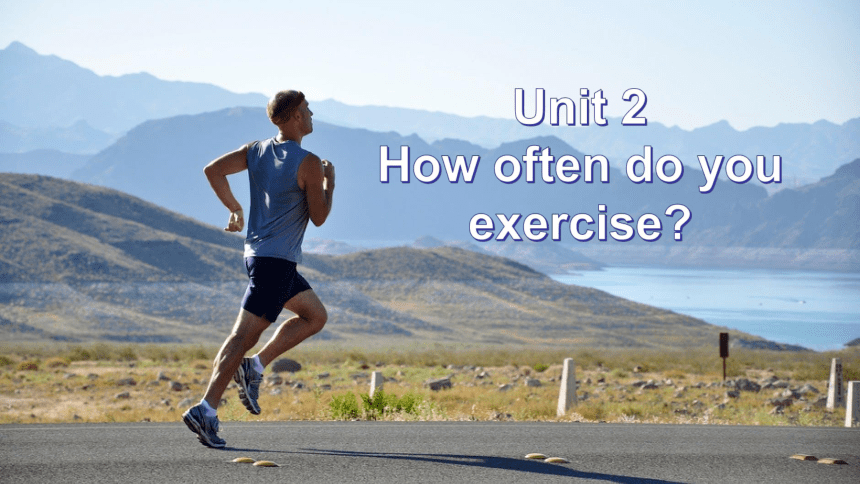

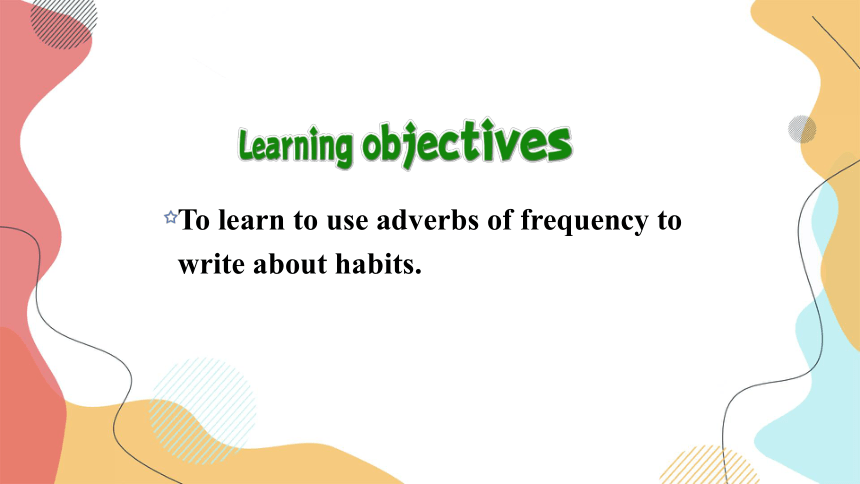
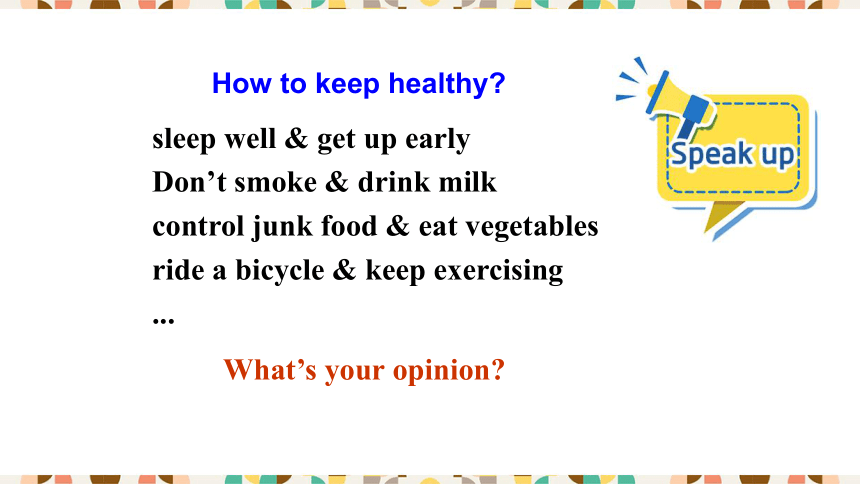
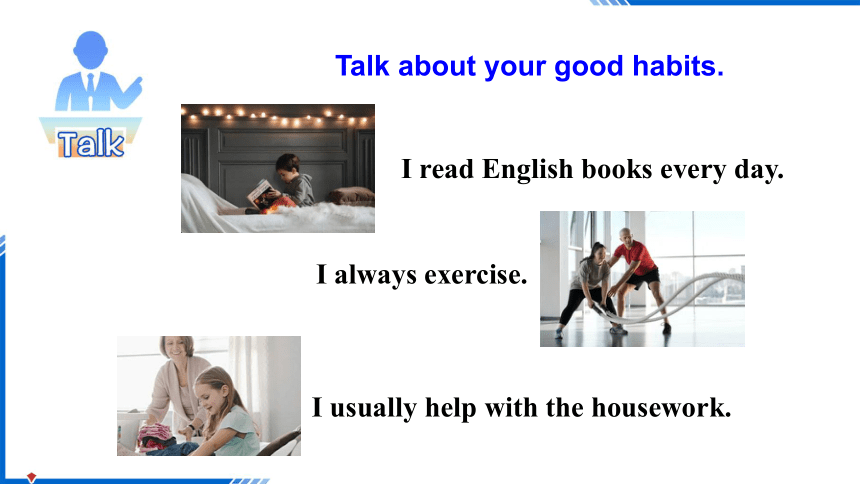
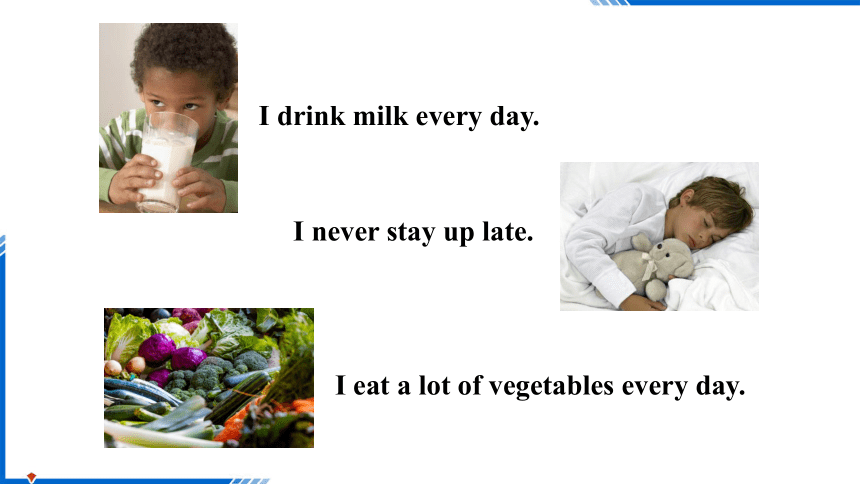
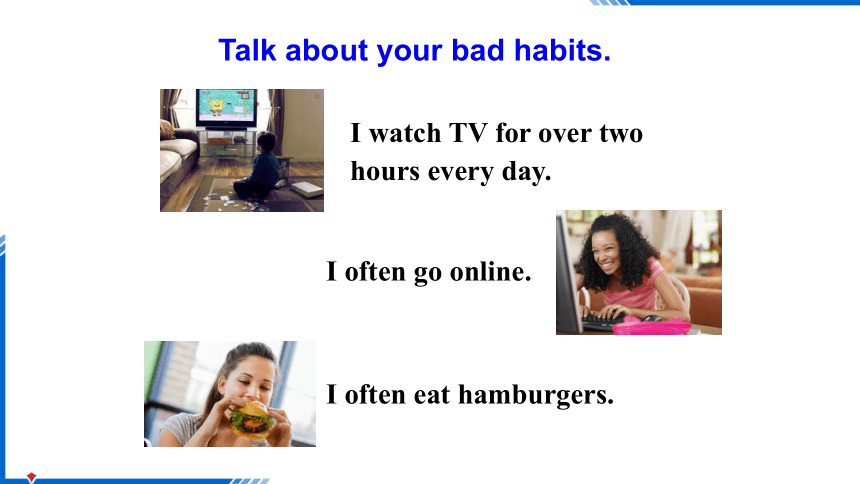
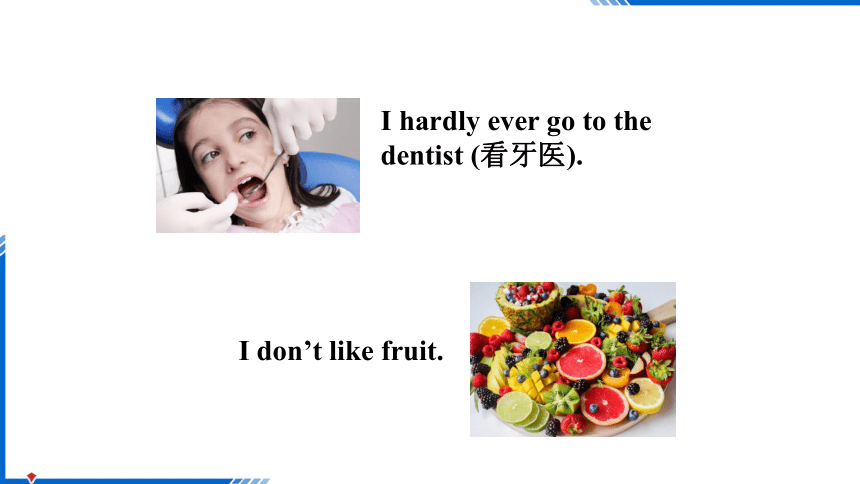
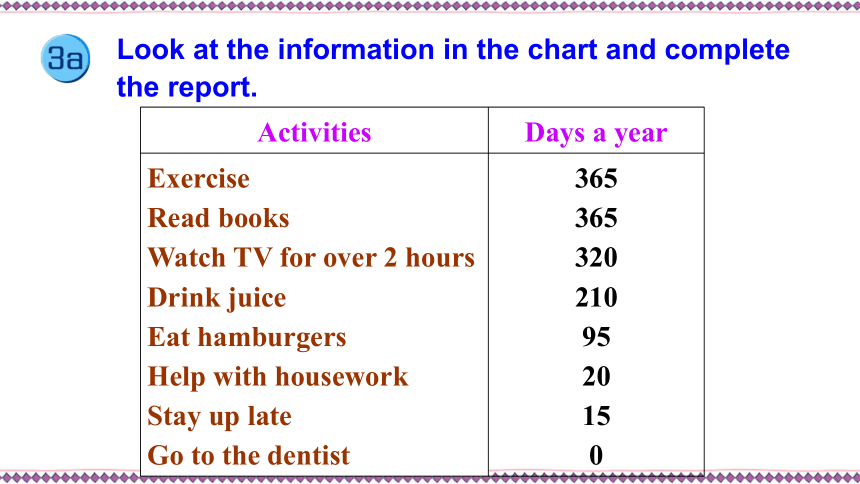
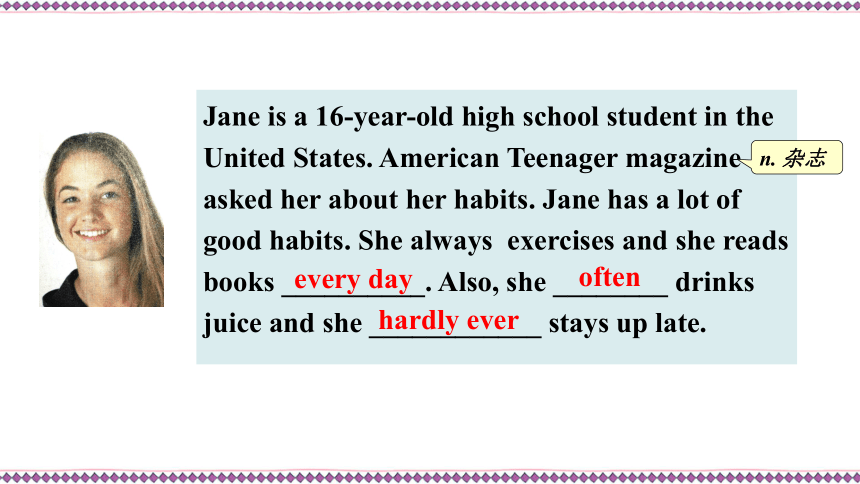
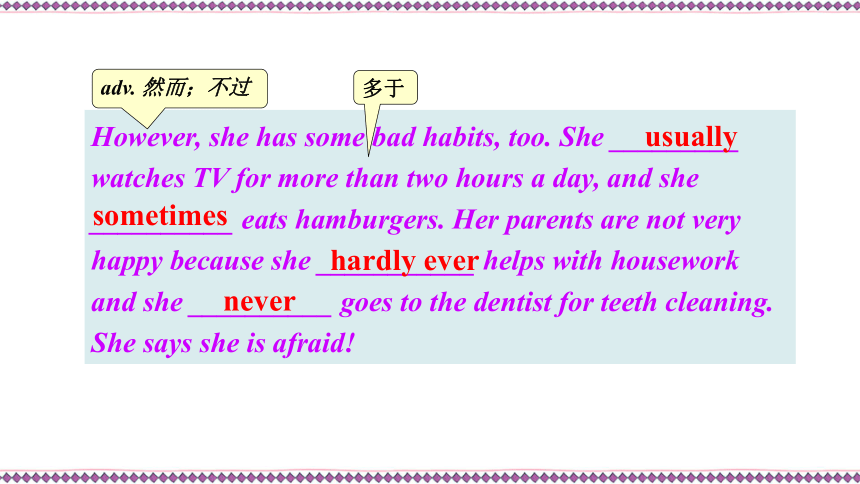
文档简介
(共38张PPT)
Unit
2
Unit
2
How
often
do
you
exercise?
To
learn
to
use
adverbs
of
frequency
to
write
about
habits.
sleep
well
&
get
up
early
Don’t
smoke
&
drink
milk
control
junk
food
&
eat
vegetables
ride
a
bicycle
&
keep
exercising
...
What’s
your
opinion?
How
to
keep
healthy?
Talk
about
your
good
habits.
I
read
English
books
every
day.
I
usually
help
with
the
housework.
I
always
exercise.
I
drink
milk
every
day.
I
never
stay
up
late.
I
eat
a
lot
of
vegetables
every
day.
Talk
about
your
bad
habits.
I
often
go
online.
I
often
eat
hamburgers.
I
watch
TV
for
over
two
hours
every
day.
I
hardly
ever
go
to
the
dentist
(看牙医).
I
don’t
like
fruit.
Activities
Days
a
year
Exercise
Read
books
Watch
TV
for
over
2
hours
Drink
juice
Eat
hamburgers
Help
with
housework
Stay
up
late
Go
to
the
dentist
365
365
320
210
95
20
15
0
Look
at
the
information
in
the
chart
and
complete
the
report.
Jane
is
a
16-year-old
high
school
student
in
the
United
States.
American
Teenager
magazine
asked
her
about
her
habits.
Jane
has
a
lot
of
good
habits.
She
always
exercises
and
she
reads
books
__________.
Also,
she
________
drinks
juice
and
she
____________
stays
up
late.
often
every
day
hardly
ever
n.
杂志
However,
she
has
some
bad
habits,
too.
She
_________
watches
TV
for
more
than
two
hours
a
day,
and
she
__________
eats
hamburgers.
Her
parents
are
not
very
happy
because
she
___________
helps
with
housework
and
she
__________
goes
to
the
dentist
for
teeth
cleaning.
She
says
she
is
afraid!
usually
sometimes
hardly
ever
never
adv.
然而;不过
多于
Habits
Activities
How
often?
Good
habits
Exercise
Read
books
Eat
fruit
Drink
milk
Stay
up
late
every
day
always
Complete
the
chart
with
your
own
information.
In
the
last
column,
use
expressions
like
always,
every
day,
twice
a
week
and
never.
every
day
never
twice
a
week
Habits
Activities
How
often
Bad
habits
Watch
TV
for
over
2
hours
Use
the
Internet
Eat
hamburgers
Help
with
housework
Go
to
the
dentist
always
often
twice
a
day
hardly
ever
never
1.
However,
she
has
some
bad
habits,
too.
however
adv.
然而,可是
表示转折关系,可放在句首、句中、句末,常用逗号隔开。
e.g.
我很饿,但她却给了我一些水。
可是我父亲没有开车去那里。(翻译)
I
was
hungry,
however,
she
gave
me
some
water.
My
father
didn’t
drive
there,
however.
2.
…watches
TV
for
more
than
two
hours
a
day,
…
more
than
超过……;多于……,后接数词,同义词为over,反义词为less
than
不到;少于。
more
than
不只是;不仅仅,后接名词。
e.g.
苏州有着2500多年的历史。
我叔叔不只是一位老师。(翻译)
Suzhou?has
a
history
of
more
than
/
over
2,500
years.
My
uncle
is
more
than
a
teacher.?
【语境应用】Ⅰ.
写出划线部分的汉语意思。
1)
John
lived
in
China
for
more
than
five
years.??
?______________
2)
He
is
more
than
a
teacher
to
us.
He
is
our
friend,
too.?
??
___________________________
Ⅱ.
同义句转换。
3)
It
took
Jason
over
30
minutes
to
get
to
school
this
morning.
It
took
Jason
_______
_______
30
minutes
to
get
to
school
this
morning.
五年多
对我们来说,他不仅仅是老师
more
than
Write
a
report
about
your
good
and
bad
habits.
Say
how
often
you
do
things.
Use
the
report
in
3a
as
an
example.
体裁:介绍自己的好习惯和坏习惯,属于说明性质的文体。
时态:介绍日常习惯时,用一般现在时。
人称:写个人习惯时,用第一人称。
介绍习惯
列提纲
写句子
引出
话题
Everyone
has
his
own
habits.
Here
are
my
good
habits
and
bad
habits.
习惯
好习惯
(1)
I
_________________________(经常帮忙做家务).
(2)
I
___________________________________.
(总是独立完成作业).
(3)
I
______________________________.
(每天吃水果蔬菜).
(4)
I
________________(看牙医)
for
teeth
cleaning
twice
a
year.
(5)
I
__________________________(上学从来不迟到).
often
help
with
housework
always
finish
my
homework
by
myself
eat
fruit
and
vegetables
every
day
go
to
the
dentist
never
arrive
late
for
school
列提纲
写句子
引出话题
Everyone
has
his
own
habits.
Here
are
my
good
habits
and
bad
habits.
习惯
坏习惯
(6)
I
never
do
some
reading.
(7)
I
____________________(经常使用互联网)
deep
into
the
night.
(8)
I
eat
junk
food
______________________(一周三到五次).
(9)
______________________________(我几乎从不运动).
often
use
the
Internet
three
to
five
times
a
week
I
hardly
ever
exercise
/
play
sports
巧衔接
罗列好习惯和坏习惯时可用and,
also等词作为列举的连接纽带,从写好习惯转到写坏习惯时可用however作为对比和转折的连接纽带。
添佳句
Good
habits
will
benefit
people
forever.
好习惯使人终生受益。
Old
habits
die
hard,
so
I’ll
start
changing
before
it’s
too
late!?
旧习难改,因此我会尽早改。
Everyone
has
his
own
habits.
Here
are
my
good
habits
and
bad
habits.
I
have
a
lot
of
good
habits.
I
often
help
with
housework
and
I
always
finish
my
homework
by
myself.
I
eat
fruit
and
vegetables
every
day.
Also,
I
go
to
the
dentist
for
teeth
cleaning
twice
a
year.
I
never
arrive
late
for
school.
Good
habits
will
benefit
people
forever.
However,
I
have
some
bad
habits
too.
I
never
do
some
reading.
I
often
use
the
Internet
deep
into
the
night.
And
I
eat
junk
food
three
to
five
times
a
week.
Also,
I
hardly
ever
exercise.
Old
habits
die
hard,
so
I'll
start
changing
before
it's
too
late.
Take
the
health
quiz.
Compare
your
results
with
your
partner’s.
Who’s
healthier?
adv.
几乎;差不多
A:
How
often
do
you
eat
breakfast?
B:
Almost
every
day.
A:
How
often
do
you
eat
fast
food?
B:
A
few
times
a
week.
A:
How
often
do
you
eat
vegetables
and
fruit?
B:
A
few
times
a
week.
A:
How
often
do
you
exercise?
B:
A
few
times
a
month.
较少;少于
pron.
没有一个
A:
How
many
hours
do
you
watch
TV
every
week?
B:
None.
A:
How
many
hours
do
you
usually
sleep
at
night?
B:
Less
than
six.
Now
look
at
the
charts
on
Page
16
and
check
the
points:
Look
at
the
first
chart.
It
says:
4-8
points:
You’re
smart
about
your
health
most
of
the
time.
Well.
Now
do
it
with
your
partners.
题号
1.
2.
3.
4.
5.
6.
总分
得分
2
1
1
1
2
0
7
n.
得分;点
9-12
points:
You’re
really
healthy!
Good
for
you—
and
your
health!
4-8
points:
You’re
smart
about
your
health
most
of
the
time.
0-3
points:
You
have
to
learn
more
about
healthy
habits.
Don’t
worry—you
can
do
it!
1.
a=0,
b=1,
c=2
2.
a=2,
b=1,
c=0
3.
a=0,
b=1,
c=2
4.
a=0,
b=1,
c=2
5.
a=2,
b=1,
c=0
6.
a=0,
b=1,
c=2
I
My
mother/father
always
usually
often
sometimes
hardly
ever
never
1.
Complete
the
chart
with
activities
you
do
and
don’t
do.
What
about
your
mother/father?
play
basketball
play
chess
read
books
read
newspapers
eat
hamburgers
eat
chicken
drink
juice
drink
tea
watch
TV
use
the
Internet
stay
up
late
get
up
early
2.
Write
five
sentences
using
the
information
above.
5.
I
hardly
ever
watch
TV.
1.
I
always
play
basketball
after
school.
2.
My
father
always
plays
chess
on
weekends.
3.
I
usually
read
books
on
weekends.
4.
My
father
sometimes
drinks
tea.
6.
My
father
never
gets
up
early.
A:
What
do
Tom
and
Mike
__________
do
on
weekends?
B:
They
sometimes
go
to
the
museum.
A:
__________
do
they
go
to
the
shopping
center?
B:
__________
ever.
Maybe
about
twice
a
month.
usually
How
often
Hardly
3.
Fill
in
the
blanks
in
the
conversation.
A:
___________
do
they
watch
TV?
B:
Mike
never
watches
TV,
but
Tom
watches
TV
_________
day.
A:
Oh,
I’m
just
like
Tom.
I
_________
watch
TV,
too.
How
often
every
always
1.
在周末
2.
去看电影
3.
几乎从不
4.
至少
5.
例如
6.
熬夜
7.
多于
8.
一点也不
on
weekends
go
to
the
movies
hardly
ever
at
least
such
as
stay
up
late
more
than
not…
at
all
Ⅰ.?根据语境及所给汉语提示,补全所缺单词。
1.
—What
do
your
parents
do?
—They're
both
________(牙医).
2.
David
writes
short
stories
for
some
__________(杂志).
3.
They
won
(赢)
the
game
by
five
________(得分)
to
three.
dentists?
magazines?
points?
4.
I
like
this
model
car.
_________(然而),
I
don't
have
money
to
buy
it.
5.
________(几乎)
everything
was
lost
in
the
fire.
However
?
Almost
Ⅱ.?根据短文内容,?从方框中选择恰当的单词填空。
once,
health,
program,
full,
start,
although,
through,
however
Gao
Ziren,
60,
is
a
teacher
at?Lixin?Village?Primary
School
in?Jiangxi?Province.
Mr.
Gao
(1)
________
teaching
at
the
age
of
18.
For
42
years,
he
has
walked
between
his
home,
the
school
and
his
students'
homes.
(2)________,
he
can't
walk
like
a
normal
(正常的)
person.
He
has
to
walk
with
some
kind
of
support
because
something
went
wrong
with
his
left
leg
when
he
was
only
one.
started
However
once,
health,
program,
full,
start,
although,
through,
however
Gao
Yangyao
(3)
_______
worked
with
Mr.
Gao
for
many
years.
He
said,
“(4)
________
he
has
difficulty
walking,
he
is
usually
the
first
to
come
to
school.”
Mr.
Gao
had
a(n)
(5)________
life
at
the
beginning
of
his
teaching.
His
Mandarin
Chinese
(普通话)
wasn't
good.
In
his
free
time,
he
improved
(提高)
it
by
listening
to
the
radio
(6)________.
once
Although
full
programs
once,
health,
program,
full,
start,
although,
through,
however
He
also
improved
his
math
and
some
other
subjects
(7)
_______
teaching
himself
or
asking
other
teachers
for
help.
Now,
many
children
follow
their
parents
to
live
and
study
in
cities,
while
some
become
left-behind
children.
Mr.
Gao
thinks
it's
important
to
be
kind
to
these
children
and
pay
more
attention
to
(多关注)
their
mental
(心理的)
(8)
_______.
“Some
students
visit
me
during
the
holidays.
It
feels
good
that
someone
remembers
you,”
Gao
Ziren
said.
through
health
Do
a
survey
in
your
family,
using
the
questions
and
charts
in
Part
4.
Preview
the
new
words
and
expressions
of
Unit
3.
Unit
2
Unit
2
How
often
do
you
exercise?
To
learn
to
use
adverbs
of
frequency
to
write
about
habits.
sleep
well
&
get
up
early
Don’t
smoke
&
drink
milk
control
junk
food
&
eat
vegetables
ride
a
bicycle
&
keep
exercising
...
What’s
your
opinion?
How
to
keep
healthy?
Talk
about
your
good
habits.
I
read
English
books
every
day.
I
usually
help
with
the
housework.
I
always
exercise.
I
drink
milk
every
day.
I
never
stay
up
late.
I
eat
a
lot
of
vegetables
every
day.
Talk
about
your
bad
habits.
I
often
go
online.
I
often
eat
hamburgers.
I
watch
TV
for
over
two
hours
every
day.
I
hardly
ever
go
to
the
dentist
(看牙医).
I
don’t
like
fruit.
Activities
Days
a
year
Exercise
Read
books
Watch
TV
for
over
2
hours
Drink
juice
Eat
hamburgers
Help
with
housework
Stay
up
late
Go
to
the
dentist
365
365
320
210
95
20
15
0
Look
at
the
information
in
the
chart
and
complete
the
report.
Jane
is
a
16-year-old
high
school
student
in
the
United
States.
American
Teenager
magazine
asked
her
about
her
habits.
Jane
has
a
lot
of
good
habits.
She
always
exercises
and
she
reads
books
__________.
Also,
she
________
drinks
juice
and
she
____________
stays
up
late.
often
every
day
hardly
ever
n.
杂志
However,
she
has
some
bad
habits,
too.
She
_________
watches
TV
for
more
than
two
hours
a
day,
and
she
__________
eats
hamburgers.
Her
parents
are
not
very
happy
because
she
___________
helps
with
housework
and
she
__________
goes
to
the
dentist
for
teeth
cleaning.
She
says
she
is
afraid!
usually
sometimes
hardly
ever
never
adv.
然而;不过
多于
Habits
Activities
How
often?
Good
habits
Exercise
Read
books
Eat
fruit
Drink
milk
Stay
up
late
every
day
always
Complete
the
chart
with
your
own
information.
In
the
last
column,
use
expressions
like
always,
every
day,
twice
a
week
and
never.
every
day
never
twice
a
week
Habits
Activities
How
often
Bad
habits
Watch
TV
for
over
2
hours
Use
the
Internet
Eat
hamburgers
Help
with
housework
Go
to
the
dentist
always
often
twice
a
day
hardly
ever
never
1.
However,
she
has
some
bad
habits,
too.
however
adv.
然而,可是
表示转折关系,可放在句首、句中、句末,常用逗号隔开。
e.g.
我很饿,但她却给了我一些水。
可是我父亲没有开车去那里。(翻译)
I
was
hungry,
however,
she
gave
me
some
water.
My
father
didn’t
drive
there,
however.
2.
…watches
TV
for
more
than
two
hours
a
day,
…
more
than
超过……;多于……,后接数词,同义词为over,反义词为less
than
不到;少于。
more
than
不只是;不仅仅,后接名词。
e.g.
苏州有着2500多年的历史。
我叔叔不只是一位老师。(翻译)
Suzhou?has
a
history
of
more
than
/
over
2,500
years.
My
uncle
is
more
than
a
teacher.?
【语境应用】Ⅰ.
写出划线部分的汉语意思。
1)
John
lived
in
China
for
more
than
five
years.??
?______________
2)
He
is
more
than
a
teacher
to
us.
He
is
our
friend,
too.?
??
___________________________
Ⅱ.
同义句转换。
3)
It
took
Jason
over
30
minutes
to
get
to
school
this
morning.
It
took
Jason
_______
_______
30
minutes
to
get
to
school
this
morning.
五年多
对我们来说,他不仅仅是老师
more
than
Write
a
report
about
your
good
and
bad
habits.
Say
how
often
you
do
things.
Use
the
report
in
3a
as
an
example.
体裁:介绍自己的好习惯和坏习惯,属于说明性质的文体。
时态:介绍日常习惯时,用一般现在时。
人称:写个人习惯时,用第一人称。
介绍习惯
列提纲
写句子
引出
话题
Everyone
has
his
own
habits.
Here
are
my
good
habits
and
bad
habits.
习惯
好习惯
(1)
I
_________________________(经常帮忙做家务).
(2)
I
___________________________________.
(总是独立完成作业).
(3)
I
______________________________.
(每天吃水果蔬菜).
(4)
I
________________(看牙医)
for
teeth
cleaning
twice
a
year.
(5)
I
__________________________(上学从来不迟到).
often
help
with
housework
always
finish
my
homework
by
myself
eat
fruit
and
vegetables
every
day
go
to
the
dentist
never
arrive
late
for
school
列提纲
写句子
引出话题
Everyone
has
his
own
habits.
Here
are
my
good
habits
and
bad
habits.
习惯
坏习惯
(6)
I
never
do
some
reading.
(7)
I
____________________(经常使用互联网)
deep
into
the
night.
(8)
I
eat
junk
food
______________________(一周三到五次).
(9)
______________________________(我几乎从不运动).
often
use
the
Internet
three
to
five
times
a
week
I
hardly
ever
exercise
/
play
sports
巧衔接
罗列好习惯和坏习惯时可用and,
also等词作为列举的连接纽带,从写好习惯转到写坏习惯时可用however作为对比和转折的连接纽带。
添佳句
Good
habits
will
benefit
people
forever.
好习惯使人终生受益。
Old
habits
die
hard,
so
I’ll
start
changing
before
it’s
too
late!?
旧习难改,因此我会尽早改。
Everyone
has
his
own
habits.
Here
are
my
good
habits
and
bad
habits.
I
have
a
lot
of
good
habits.
I
often
help
with
housework
and
I
always
finish
my
homework
by
myself.
I
eat
fruit
and
vegetables
every
day.
Also,
I
go
to
the
dentist
for
teeth
cleaning
twice
a
year.
I
never
arrive
late
for
school.
Good
habits
will
benefit
people
forever.
However,
I
have
some
bad
habits
too.
I
never
do
some
reading.
I
often
use
the
Internet
deep
into
the
night.
And
I
eat
junk
food
three
to
five
times
a
week.
Also,
I
hardly
ever
exercise.
Old
habits
die
hard,
so
I'll
start
changing
before
it's
too
late.
Take
the
health
quiz.
Compare
your
results
with
your
partner’s.
Who’s
healthier?
adv.
几乎;差不多
A:
How
often
do
you
eat
breakfast?
B:
Almost
every
day.
A:
How
often
do
you
eat
fast
food?
B:
A
few
times
a
week.
A:
How
often
do
you
eat
vegetables
and
fruit?
B:
A
few
times
a
week.
A:
How
often
do
you
exercise?
B:
A
few
times
a
month.
较少;少于
pron.
没有一个
A:
How
many
hours
do
you
watch
TV
every
week?
B:
None.
A:
How
many
hours
do
you
usually
sleep
at
night?
B:
Less
than
six.
Now
look
at
the
charts
on
Page
16
and
check
the
points:
Look
at
the
first
chart.
It
says:
4-8
points:
You’re
smart
about
your
health
most
of
the
time.
Well.
Now
do
it
with
your
partners.
题号
1.
2.
3.
4.
5.
6.
总分
得分
2
1
1
1
2
0
7
n.
得分;点
9-12
points:
You’re
really
healthy!
Good
for
you—
and
your
health!
4-8
points:
You’re
smart
about
your
health
most
of
the
time.
0-3
points:
You
have
to
learn
more
about
healthy
habits.
Don’t
worry—you
can
do
it!
1.
a=0,
b=1,
c=2
2.
a=2,
b=1,
c=0
3.
a=0,
b=1,
c=2
4.
a=0,
b=1,
c=2
5.
a=2,
b=1,
c=0
6.
a=0,
b=1,
c=2
I
My
mother/father
always
usually
often
sometimes
hardly
ever
never
1.
Complete
the
chart
with
activities
you
do
and
don’t
do.
What
about
your
mother/father?
play
basketball
play
chess
read
books
read
newspapers
eat
hamburgers
eat
chicken
drink
juice
drink
tea
watch
TV
use
the
Internet
stay
up
late
get
up
early
2.
Write
five
sentences
using
the
information
above.
5.
I
hardly
ever
watch
TV.
1.
I
always
play
basketball
after
school.
2.
My
father
always
plays
chess
on
weekends.
3.
I
usually
read
books
on
weekends.
4.
My
father
sometimes
drinks
tea.
6.
My
father
never
gets
up
early.
A:
What
do
Tom
and
Mike
__________
do
on
weekends?
B:
They
sometimes
go
to
the
museum.
A:
__________
do
they
go
to
the
shopping
center?
B:
__________
ever.
Maybe
about
twice
a
month.
usually
How
often
Hardly
3.
Fill
in
the
blanks
in
the
conversation.
A:
___________
do
they
watch
TV?
B:
Mike
never
watches
TV,
but
Tom
watches
TV
_________
day.
A:
Oh,
I’m
just
like
Tom.
I
_________
watch
TV,
too.
How
often
every
always
1.
在周末
2.
去看电影
3.
几乎从不
4.
至少
5.
例如
6.
熬夜
7.
多于
8.
一点也不
on
weekends
go
to
the
movies
hardly
ever
at
least
such
as
stay
up
late
more
than
not…
at
all
Ⅰ.?根据语境及所给汉语提示,补全所缺单词。
1.
—What
do
your
parents
do?
—They're
both
________(牙医).
2.
David
writes
short
stories
for
some
__________(杂志).
3.
They
won
(赢)
the
game
by
five
________(得分)
to
three.
dentists?
magazines?
points?
4.
I
like
this
model
car.
_________(然而),
I
don't
have
money
to
buy
it.
5.
________(几乎)
everything
was
lost
in
the
fire.
However
?
Almost
Ⅱ.?根据短文内容,?从方框中选择恰当的单词填空。
once,
health,
program,
full,
start,
although,
through,
however
Gao
Ziren,
60,
is
a
teacher
at?Lixin?Village?Primary
School
in?Jiangxi?Province.
Mr.
Gao
(1)
________
teaching
at
the
age
of
18.
For
42
years,
he
has
walked
between
his
home,
the
school
and
his
students'
homes.
(2)________,
he
can't
walk
like
a
normal
(正常的)
person.
He
has
to
walk
with
some
kind
of
support
because
something
went
wrong
with
his
left
leg
when
he
was
only
one.
started
However
once,
health,
program,
full,
start,
although,
through,
however
Gao
Yangyao
(3)
_______
worked
with
Mr.
Gao
for
many
years.
He
said,
“(4)
________
he
has
difficulty
walking,
he
is
usually
the
first
to
come
to
school.”
Mr.
Gao
had
a(n)
(5)________
life
at
the
beginning
of
his
teaching.
His
Mandarin
Chinese
(普通话)
wasn't
good.
In
his
free
time,
he
improved
(提高)
it
by
listening
to
the
radio
(6)________.
once
Although
full
programs
once,
health,
program,
full,
start,
although,
through,
however
He
also
improved
his
math
and
some
other
subjects
(7)
_______
teaching
himself
or
asking
other
teachers
for
help.
Now,
many
children
follow
their
parents
to
live
and
study
in
cities,
while
some
become
left-behind
children.
Mr.
Gao
thinks
it's
important
to
be
kind
to
these
children
and
pay
more
attention
to
(多关注)
their
mental
(心理的)
(8)
_______.
“Some
students
visit
me
during
the
holidays.
It
feels
good
that
someone
remembers
you,”
Gao
Ziren
said.
through
health
Do
a
survey
in
your
family,
using
the
questions
and
charts
in
Part
4.
Preview
the
new
words
and
expressions
of
Unit
3.
同课章节目录
- Unit 1 Where did you go on vacation?
- Section A
- Section B
- Unit 2 How often do you exercise?
- Section A
- Section B
- Unit 3 I'm more outgoing than my sister.
- Section A
- Section B
- Unit 4 What's the best movie theater?
- Section A
- Section B
- Unit 5 Do you want to watch a game show?
- Section A
- Section B
- Unit 6 I'm going to study computer science.
- Section A
- Section B
- Unit 7 Will people have robots?
- Section A
- Section B
- Unit 8 How do you make a banana milk shake?
- Section A
- Section B
- Unit 9 Can you come to my party?
- Section A
- Section B
- Unit 10 If you go to the party, you'll have a grea
- Section A
- Section B
